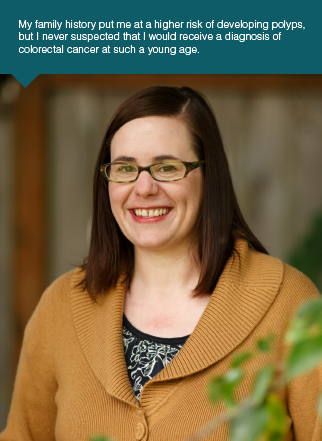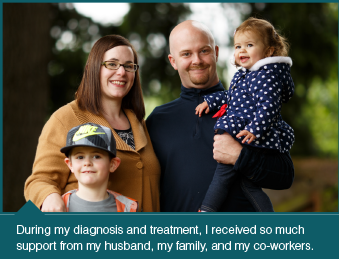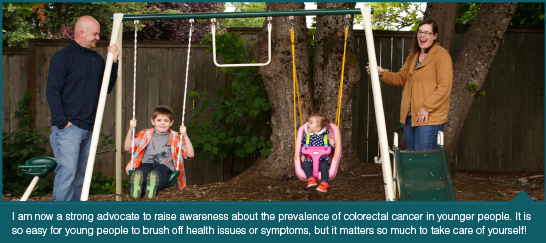Katie shares her story of battling colorectal cancer at a young age.
 “I am not your typical colorectal cancer survivor.”
“I am not your typical colorectal cancer survivor.”At 34 years old, I am not the typical face of a colorectal cancer survivor. While my family history put me at a higher risk of developing precancerous colon polyps, my decisions to put my health first ultimately saved my life. Now in remission, I can thank my team of providers, including my gastroenterologist at The Oregon Clinic, for their expertise and compassion for my situation.
During a trip with my young son and husband when I was 33 years old, I started to experience a symptom that was very abnormal for my body: rectal bleeding.
While I originally brushed off this symptom, hoping it was a one-time occurrence, my family advised me to not let it go unchecked for too long, especially given my family history of precancerous colon polyps. I promised myself that, if my symptoms persisted for two weeks, I would make an appointment with my doctor. Two weeks later, armed with my research from extensive Google searches on my symptoms, I kept my promise to myself and made an appointment with my primary care doctor to talk about my symptoms. After several tests were performed to rule out more common conditions or ailments, my doctor referred me to The Oregon Clinic to receive care from Dr. Zhu, a specialist in the field of gastroenterology.

Dr. Zhu recommended that I receive a colonoscopy, the gold standard to test for colon polyps. While the initial preparation was time consuming, the actual procedure was very easy. I received anesthesia and was asleep for the entire procedure. The results of my colonoscopy found four polyps: three in the rectum, and one in the ascending colon. One of the polyps found in the rectum tested positive for cancer, and I was officially diagnosed with Stage 1 Rectal Cancer.
I will never forget the conversation that Dr. Zhu and I had when I received my diagnosis. I was scared. My team of doctors helped guide me through my next steps, resulting in my decision to have a abdominoperineal resection—a surgery to remove my rectum—and have a colostomy bag placed.
While the diagnosis and treatment were difficult physically and emotionally, I am alive today because of my decision to get my body checked.

I was the poster child of everything someone should do correctly, both before and after receiving a diagnosis of colorectal cancer at a young age. I am currently in remission, but I still pay close attention to symptoms my body may be experiencing, and understand now more than ever that being aware of your body and being proactive in seeking care can save your life.
“Being aware of your body and being proactive in seeking care can save your life.”
Since my diagnosis and treatment, I have become a strong advocate for understanding your body, your family history, and personal risks for colorectal cancer. It has become very important to me to become an advocate for individuals who may be at a higher risk for colorectal cancer, or who don’t understand the benefits of getting screened.
The most important advice I would give to any person—whether or not you think you are facing the possibility of a serious, life threatening condition—is to never let a problem with your body persist for more than two weeks.
Make time for the things that matter; your health should be at the top of that list. Don’t allow yourself to wait, or to get so caught up in your daily life that you push off taking care of yourself. If you have symptoms that are abnormal for you and your body, get it checked out.
From the Specialist’s Perspective:
Dr. Amy Zhu is board-certified in internal medicine and gastroenterology, and has a solid background in gastrointestinal research.
Katie was quite a memorable patient to me. I remember her not only because of the surprising diagnosis of colorectal cancer in someone her age, but also for her positive attitude and pleasant demeanor even when she was scared. I am sure Katie’s story resonates with cancer survivors everywhere, and the important take-away is to not ignore your symptoms such as rectal bleeding, a change in your bowel habits, or abdominal pain regardless of your age. Most often it is a benign and simple problem, but on the off-chance it is not, undergoing a recommended procedure such as a colonoscopy can be life-saving.
“…the important take-away is to not ignore your symptoms… regardless of your age.”
To learn more about the symptoms of colorectal cancer as well as recommended screening guidelines, visit https://www.oregonclinic.com/resource/colonoscopy-screening/